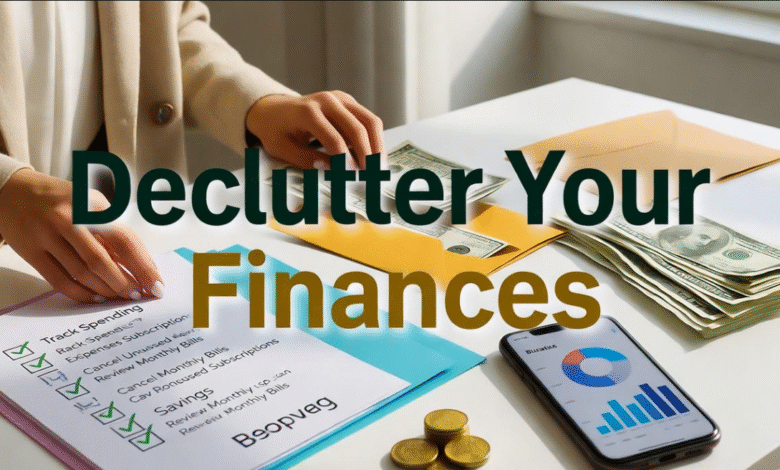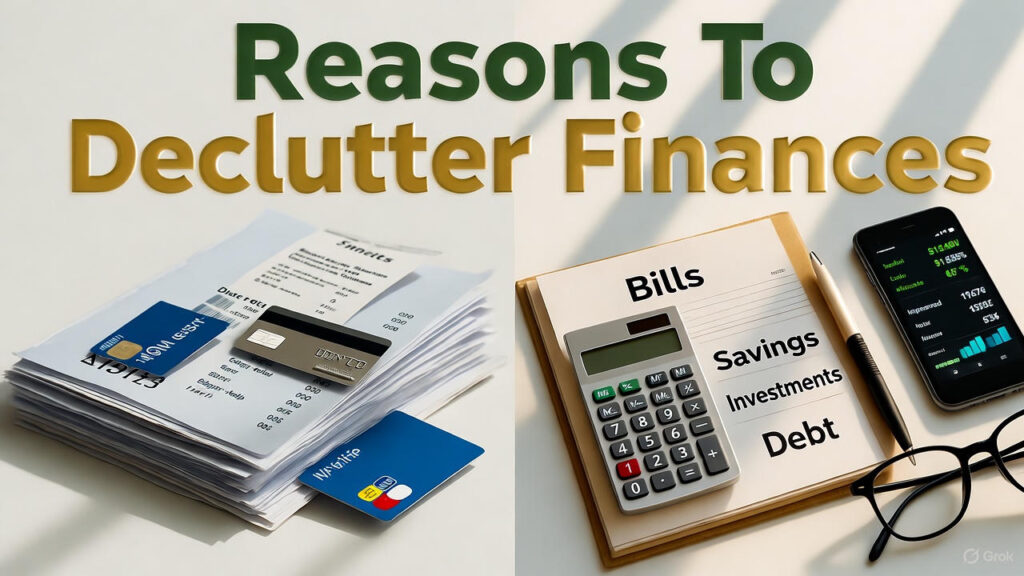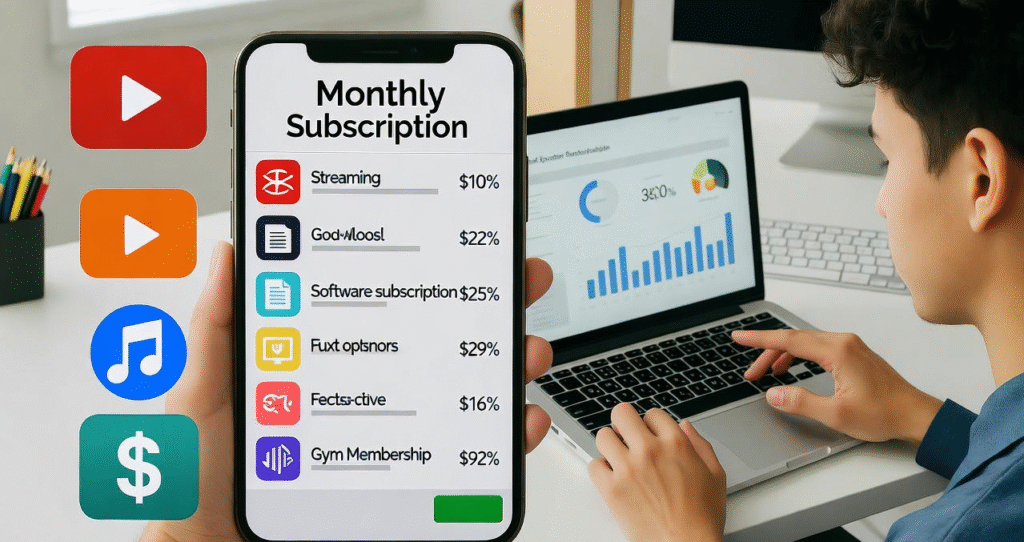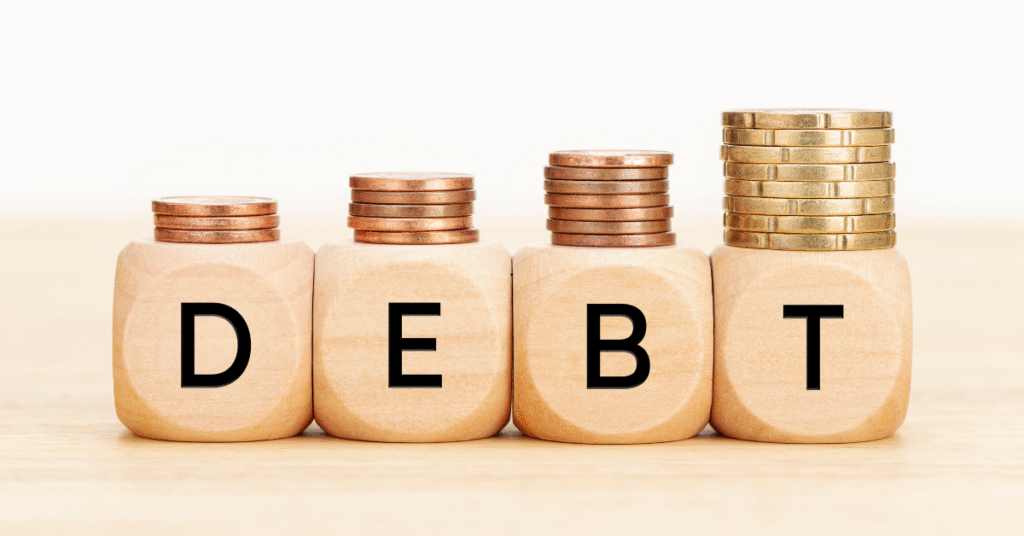How To Declutter Your Finances In 10 Easy Steps

You know that feeling when you open your closet and clothes just tumble out? That’s exactly what your finances look like right now. Trust me, I’ve been there. Between my master’s degree coursework and real-world financial consulting, I’ve seen countless people drowning in financial chaos, and honestly, most of us are just winging it.
Here’s the thing: your money situation doesn’t have to feel like a never-ending episode of financial anxiety. Learning how to declutter your finances is like Marie Kondo-ing your bank account, except instead of asking if something “sparks joy,” you’re asking if it’s draining your wallet. Spoiler alert, it probably is.
I’m about to walk you through a system that transformed my own financial mess (yes, even finance professionals mess up) into something I can actually manage without having a mini panic attack every time I check my bank balance. No fluff, no boring jargon, just straight talk about getting your money organised.
What Does It Mean To Declutter Your Finances?
Let me break this down real quick. Decluttering your finances isn’t about becoming some minimalist guru who only owns three things and eats ramen for every meal. Nope.
It’s about cutting the financial fat, removing expenses, obligations, and paperwork that serve zero purpose in your life. Think of it as a financial detox. You’re getting rid of that gym membership you haven’t used since January (we’ve all been there), those random subscriptions you forgot existed, and the mountain of bank statements collecting dust in your drawer.
When I say “declutter,” I mean creating a streamlined financial system where every dollar has a purpose and every account serves a function. It’s about knowing exactly where your money goes instead of wondering why you’re broke three days after payday.
Here’s what financial decluttering actually looks like in practice:
- Cancelling subscriptions you don’t use (looking at you, Premium Spotify account you share with your ex)
- Consolidating multiple bank accounts into one or two manageable ones
- Digitising paperwork so you’re not buried under receipts from 2019
- Automating bill payments so you stop getting late fees
- Actually understanding what you spend money on each month
The goal? Less mental stress, more financial control, and way fewer “where did my money go?” moments.
4 Costly Reasons To Declutter Your Finances

Alright, let’s talk about why this matters. Because I know what you’re thinking: “I’ll get to it eventually.” Yeah, that’s what everyone says right before their financial situation implodes.
1. Declutter Your Finances To Prevent Overspending
Ever noticed how you spend more when you have no clue where your money’s going? That’s not a coincidence, it’s psychology.
When your finances are cluttered with too many expenses, accounts, and subscriptions, you lose track of your spending patterns. It’s like trying to navigate a city without a map; you’re just wandering around hoping you don’t end up in a sketchy neighbourhood (aka broke).
I learned this the hard way during grad school. I had subscriptions to three different streaming services, two cloud storage accounts, and a meal kit delivery service I barely used. Each one seemed small, just $10 here, $15 there. But collectively? I was bleeding $80+ monthly on stuff I rarely touched.
The real kicker: When you’re not paying attention, those “small” expenses add up to thousands annually. That’s money that could’ve gone toward your emergency fund, vacation savings, or literally anything more useful than the premium tier of a meditation app you opened twice.
Overspending also triggers a dangerous cycle. You spend more → you feel guilty → you ignore your finances → you spend more because ignorance is bliss, right? Wrong. It’s financial quicksand.
2. Declutter Your Finances To Avoid Financial Anxiety
Let’s get real, money stress is one of the biggest sources of anxiety in modern life, and it doesn’t discriminate. I’ve worked with high-earning professionals who lose sleep over their finances simply because everything feels chaotic.
Financial anxiety happens when you’re constantly worried about:
- Whether you have enough to cover next month’s rent
- If that random charge on your credit card is fraud
- How you afford unexpected expenses
- Whether you’re saving enough for the future
This type of stress doesn’t just hurt your wallet; it messes with your mental health, relationships, and overall quality of life. I’ve seen clients develop physical symptoms (headaches, insomnia, digestive issues) purely from financial stress.
Here’s what most people don’t realise: financial anxiety often stems from disorganisation rather than actual lack of money. When you can’t see the full picture of your finances, your brain fills in the gaps with worst-case scenarios. It’s like watching a horror movie where your imagination is scarier than what’s actually on screen.
Decluttering your finances provides clarity. You’ll know exactly what you have, what you owe, and what you can afford. That knowledge alone reduces anxiety by about 70%, based on my client observations.
3. Declutter Your Finances To Avoid Debt
Here’s an uncomfortable truth I share with every client: most debt isn’t caused by genuine emergencies; it’s caused by financial disorganisation.
Sure, medical bills and job loss contribute to debt. But for the average person? Debt accumulates because of:
- Not tracking expenses properly
- Lifestyle inflation (earning more but spending even more)
- Using credit cards as a backup “plan” instead of an emergency fund
- Saying yes to every dinner invite, concert, and spontaneous purchase
When your finances are cluttered, you have no spending guardrails. Swipe your card without knowing if you can actually afford it. Take on payment plans without calculating the total cost. Finance purchases instead of saving up first.
I’ve reviewed thousands of personal budgets, and the pattern is always the same: people in debt have zero visibility into their cash flow. They couldn’t tell you their monthly expenses if their life depended on it. They just hope it all works out (it doesn’t).
Decluttering forces you to confront reality. You’ll see exactly where money is leaking, which expenses are negotiable, and what you can realistically afford. That awareness is your first line of defence against debt.
4. Declutter Your Finances To Prevent Unaccomplished Financial Goals
Let me guess, you’ve set financial goals before. Maybe you wanted to save $5,000 for a vacation, pay off your car loan early, or build a six-month emergency fund. How’d that work out?
If you’re like most people, those goals are still sitting in your “someday” folder, collecting dust next to your New Year’s resolutions to hit the gym.
Here’s why financial goals fail: lack of structure and accountability. It’s not because you lack discipline or willpower; it’s because your finances are too messy to support those goals.
When your money is scattered across multiple accounts, eaten up by random subscriptions, and lost in the shuffle of day-to-day spending, there’s nothing left for your actual goals. You’re running on a financial treadmill, working hard but getting nowhere.
Financial decluttering creates space for intentional saving and investing. It’s like clearing your desk before starting an important project. You need a clean workspace (or in this case, a clean financial foundation) to make progress.
I’ve watched clients achieve in six months what they couldn’t accomplish in six years, purely because they organised their finances first. Once they had clarity and structure, their goals stopped being wishful thinking and started becoming reality.
10 Ways To Declutter Your Finances
Okay, enough theory. Let’s get practical. These 10 strategies will transform your financial chaos into something actually manageable.
1. Assemble Your Financial Documents

I know, I know, this sounds about as fun as doing taxes. But hear me out.
You need to know what you’re working with before you can organise anything. This means gathering every financial document you have: bank statements, insurance policies, loan agreements, investment account info, bills, receipts, tax returns, everything.
Set aside a Saturday morning, grab some coffee, and start the scavenger hunt. Check your:
- Email inbox for digital statements
- Physical filing cabinets and drawers
- Glove compartment (seriously, why do we keep receipts there?)
- That random kitchen drawer where important papers go to die
Pro tip from my own experience: Create a digital filing system immediately. Use Google Drive, Dropbox, or even just organised folders on your computer. Scan everything important and label it clearly: “2024 Tax Returns,” “Car Insurance Policy,” “Student Loan Documents.”
Why this matters: You can’t manage what you can’t see. Having all your financial information in one accessible place (digitally) saves you hours of stress when you need something urgently. Plus, you’ll finally know what subscriptions you’re paying for, what debts you owe, and what assets you actually have.
The first time I did this exercise, I discovered I was paying for a magazine subscription I forgot about in 2018. Two years of $120 annual charges I never noticed. That’s $240 straight into the trash. Don’t be me.
2. Bid Farewell To Paper Statements And Physical Bills
Let’s have an honest conversation about paper bills; they’re outdated, environmentally wasteful, and a clutter nightmare.
I used to receive paper statements from my bank, credit cards, utility companies, and insurance providers. My desk looked like a paper factory had exploded. Every month brought a fresh pile of envelopes that I’d open, glance at, and then… forget about until I needed them (and of course couldn’t find them).
Switching to electronic statements was life-changing. Here’s how to make the transition:
- Log into each account (bank, credit card, utilities, insurance)
- Navigate to settings or preferences
- Select “paperless statements” or “electronic delivery”
- Confirm your email address
Benefits you’ll notice immediately:
- No more paper piles cluttering your space
- Statements arrive instantly via email
- Easy to search and retrieve documents digitally
- Better for the environment (if that motivates you)
- Harder to lose important financial information
Most companies actually prefer electronic delivery, as it saves them money on printing and postage. Some even offer small incentives like fee waivers or statement credits for going paperless.
Word of caution: Make sure you’re actually checking your email regularly. Set up a separate folder for financial statements so they don’t get lost in the promotional email chaos.
3. Get Yourself A Shredder
Even with electronic statements, some physical documents will inevitably enter your life. Old tax returns, paid-off loan statements, receipts you no longer need, this stuff piles up fast.
Here’s what most people don’t consider: these documents contain sensitive personal information. Your Social Security number, account numbers, addresses, and financial details are identity theft gold mines. Throwing them in the regular trash is basically gift-wrapping your identity for criminals.
Invest in a cross-cut shredder (they cost around $30-50 on Amazon). Cross-cut shredders turn paper into confetti-sized pieces that are nearly impossible to reassemble, unlike strip-cut shredders that just make long strips.
Make shredding part of your monthly routine:
- Shred bank statements older than one year (unless needed for taxes)
- Destroy receipts after you’ve verified the charges
- Shred pre-approved credit card offers immediately
- Eliminate old insurance statements once you’ve confirmed new coverage
Pro tip: Keep tax-related documents for at least seven years (IRS recommendation). Everything else? Once it’s scanned and saved digitally, shred the physical copy without guilt.
I shred documents while watching TV or listening to podcasts. Makes the task less tedious, and honestly, there’s something satisfying about destroying old bills. 🙂
4. Examine Your Subscriptions

This is where things get uncomfortable, but also where you’ll save the most money immediately.
Americans waste an average of $273 monthly on subscriptions they rarely use, according to recent consumer spending research. That’s over $3,200 annually, enough for a decent vacation or solid emergency fund contribution.
Time for brutal honesty. Pull up your bank and credit card statements from the past three months and highlight every recurring charge. You’ll probably find:
- Streaming services you forgot about (Netflix, Hulu, Disney+, HBO Max, Paramount+…)
- Gym memberships are collecting dust
- Software subscriptions for tools you no longer use
- Beauty boxes and subscription services
- Music streaming services
- Cloud storage upgrades you don’t need
- That one app trial you forgot to cancel (now $9.99/month for six months)
Here’s my challenge: For each subscription, ask yourself, “Have I used this in the past 30 days?” If the answer is no, cancel it. Not “I might use it eventually”, actually used it.
Real talk: I was paying for Audible ($14.95/month) despite not listening to audiobooks for over a year. I kept it because “I might start again.” I never did. That’s $180 annually, I was lighting on fire for no reason.
Tools that help:
- Truebill (now Rocket Money) – automatically identifies and helps cancel subscriptions
- Trim – negotiates bills and cancels unwanted subscriptions
- Your bank’s budgeting tools often categorise recurring charges
Cancel ruthlessly. You can always resubscribe if you genuinely miss something (you probably won’t).
5. Automate Your Accounts
Let me share something from my finance classes that stuck with me: the best financial system is one that runs on autopilot.
Why? Because relying on willpower and memory is a recipe for disaster. Life gets busy, work deadlines, family obligations, social commitments, and suddenly it’s the 15th and you forgot to transfer money to savings. Again.
Automation removes the human error factor. Here’s what you should automate immediately:
Direct deposit split:
- Set up your paycheck to automatically split between checking and savings
- Example: 70% to checking for expenses, 20% to savings, 10% to investment account
Automatic savings transfers:
- Schedule monthly transfers from checking to your emergency fund
- Set up automatic contributions to retirement accounts (401k, IRA, Roth IRA)
- Automate investment account deposits if you’re building wealth
Debt payments:
- Schedule automatic minimum payments for all debts
- Set up extra payments toward your highest-interest debt
The psychological benefit: Money you never see in your checking account is money you won’t spend. It’s the “out of sight, out of mind” principle working in your favour.
I set up automation five years ago, and my savings account grew without me thinking about it. That passive accumulation is powerful; it’s how wealth gets built quietly in the background while you focus on living your life.
Platforms that make this easy:
- Ally Bank – excellent automation features and high-yield savings
- Digit – analyses spending and saves automatically
- Qapital – savings automation with goal tracking
6. Set Bills On Autopay
Missing bill payments is expensive and completely avoidable. Late fees typically range from $25-$40 per missed payment, and they damage your credit score, a double whammy of financial pain.
Autopay solves this problem permanently. Here’s how to set it up correctly:
Essential bills to automate:
- Rent or mortgage (via bank’s bill pay system)
- Utilities (electric, water, gas, internet)
- Insurance premiums (auto, health, renters/homeowners)
- Credit card minimum payments (though you should pay in full)
- Loan payments (student loans, car loans, personal loans)
How to avoid autopay disasters:
- Maintain a buffer in your checking account – Keep at least one month’s expenses as a cushion so you never overdraft
- Use a dedicated checking account – Consider a separate account solely for bills to avoid confusion
- Set payment dates strategically – Schedule payments for 3-5 days after your paycheck deposits
- Monitor regularly – Autopay doesn’t mean “forget and ignore.” Review charges monthly to catch errors
Pro tip: For variable bills (like credit cards), set autopay to the minimum payment only, then manually pay the remaining balance. This ensures you never miss a payment while maintaining control over cash flow.
I used to manually pay bills because I wanted “control.” Then I forgot my credit card payment twice in six months,$70 in late fees, plus credit score damage. Autopay has saved me hundreds since then, and ironically, I feel more in control because I’m not constantly worried about forgetting something.
7. Pay Down Debts

Let’s talk about the elephant in the room: debt is the ultimate financial clutter.
Every debt you carry creates mental noise. You’re tracking due dates, calculating interest, and wondering if you’ll ever be free. It’s exhausting. Plus, debt payments restrict your financial flexibility and prevent you from pursuing opportunities.
Why debt decluttering matters:
- Frees up cash flow for savings and investments
- Reduces financial stress and improves mental health
- Improves credit score (lower credit utilisation ratio)
- Eliminates late fees and high interest charges
- Creates psychological momentum toward other financial goals
Two effective debt payoff strategies:
The Avalanche Method (mathematically optimal):
- Pay minimums on all debts
- Put extra money toward the highest interest rate debt first
- Once that’s paid off, tackle the next highest rate
- Saves the most money on interest over time
The Snowball Method (psychologically effective):
- Pay minimums on all debts
- Put extra money toward the smallest balance first
- Once paid off, tackle the next smallest balance
- Builds momentum through quick wins
My take? If you’re someone who needs motivation, start with the snowball method. That first debt you eliminate creates incredible psychological motivation to keep going. I’ve seen clients pay off $30,000+ in debt using this method because those early wins kept them engaged.
Practical tactics for faster debt payoff:
- Use windfalls (tax refunds, bonuses, gifts) exclusively for debt
- Temporarily pause retirement contributions beyond the employer match
- Sell unused items and put the proceeds toward debt
- Pick up a side hustle and funnel all income to debt
- Negotiate lower interest rates on credit cards (call and ask, it works)
Real talk: I graduated with $45,000 in student loans. It felt suffocating. Using the avalanche method and aggressive extra payments, I eliminated it in four years instead of ten. The month I made that final payment? Best financial feeling ever. Being debt-free creates mental and financial space you didn’t know you were missing.
8. Use Payment Apps
Cash is inefficient, cards create paper trails of receipts, and checks are basically extinct. Digital payment apps are the decluttered payment method for modern life.
Benefits of payment apps:
- No physical cash or receipts to manage
- Instant transaction records in your email/app history
- Easy expense tracking and categorisation
- Contactless payments (faster and more secure)
- Split bills seamlessly with friends
Essential payment apps to use:
For everyday purchases:
- Apple Pay – for iPhone users, accepted almost everywhere
- Google Pay – Android equivalent, equally widely accepted
- Samsung Pay – works with even more terminals
For person-to-person payments:
- Venmo – social payment platform, great for splitting bills
- PayPal – a trusted platform, useful for online purchases
- Zelle – bank-integrated, instant transfers (my personal favourite)
- Cash App – versatile, includes investment and Bitcoin options
How this declutters your finances:
Instead of collecting receipts you’ll lose or cash you’ll misplace, everything is automatically tracked in your banking app or payment platform. When you need to remember what you spent at Target last Tuesday, it’s right there in your transaction history with date, time, and amount.
Plus, payment apps make budgeting easier. Most integrate with budgeting tools like Mint or YNAB, automatically categorising your spending so you see exactly where your money goes.
Privacy note: Choose your payment app based on your comfort level with data sharing. Venmo shows transactions publicly by default (change this in settings), while Zelle is more private since it’s bank-integrated.
9. Build And Monitor Your Budget
Here’s an unpopular opinion: you can’t successfully manage your finances without a budget, period.
I know “budget” sounds restrictive and boring. But think of it as a spending plan, a roadmap showing exactly where your money goes each month. Without one, you’re just hoping things work out (they won’t).
Why budgeting is essential for decluttering:
- Eliminates the “where did my money go?” question
- Identifies spending leaks and waste
- Creates boundaries that prevent overspending
- Reduces financial anxiety through visibility
- Enables progress toward savings goals
Building a functional budget (step-by-step):
1: Calculate total monthly income
- Salary (after taxes)
- Side hustle earnings
- Child support, alimony
- Investment income, dividends
- Any other reliable income sources
2: List all monthly expenses
- Housing (rent/mortgage, utilities, internet)
- Transportation (car payment, insurance, gas, maintenance)
- Food (groceries, dining out)
- Debt payments (credit cards, loans)
- Insurance (health, life, disability)
- Subscriptions and memberships
- Personal care and clothing
- Entertainment and hobbies
- Savings and investments
3: Categorise expenses
- Fixed expenses – same amount monthly (rent, car payment)
- Variable expenses – fluctuate monthly (groceries, gas)
- Discretionary expenses – optional spending (entertainment, dining out)
4: Apply a budgeting framework
I recommend the 50/30/20 rule for beginners:
- 50% – Needs (housing, utilities, groceries, transportation, insurance, minimum debt payments)
- 30% – Wants (dining out, entertainment, hobbies, subscriptions, travel)
- 20% – Savings and extra debt payments (emergency fund, retirement, investments, debt above minimums)
Example with $4,000 monthly take-home:
- Needs: $2,000
- Wants: $1,200
- Savings/debt: $800
Step 5: Track and adjust monthly
Your first budget will be wrong; that’s normal. Track actual spending for 2-3 months, then adjust categories to reflect reality. Maybe you’re spending more on groceries than expected, but less on entertainment. The goal is awareness and improvement, not perfection.
Budget monitoring tips:
- Review spending weekly (takes 10 minutes)
- Adjust categories as life changes
- Be honest about overspending instead of ignoring it
- Celebrate when you stay on budget (positive reinforcement works)
I resisted budgeting for years because it felt restrictive. Then I realised budgets actually create freedom, freedom to spend guilt-free within your limits because you know you’ve covered essentials and savings first. That clarity is decluttering at its finest.
10. Use Budgeting Apps
Let’s be honest, manually tracking expenses in a spreadsheet sounds terrible. That’s why budgeting apps exist, and they’re game-changers for financial decluttering.
These tools automatically sync with your bank accounts, categorise transactions, and show exactly where your money goes, no manual entry required. It’s like having a financial assistant in your pocket.
Top budgeting apps worth using:
Mint (Free)
- Automatically categorises transactions
- Creates budgets and tracks spending
- Monitors credit score for free
- Bill payment reminders
- Best for: Beginners wanting a free, comprehensive solution
YNAB – You Need A Budget ($14.99/month or $99/year)
- Zero-based budgeting system
- Forces you to give every dollar a job
- Excellent for aggressive savers and debt payoff
- Includes free financial education workshops
- Best for: People serious about financial control
PocketGuard (Free with premium option)
- Shows how much you have left to spend after bills and savings
- Identifies recurring subscriptions
- Helps negotiate lower bills
- Best for: People who want simple “can I afford this?” answers
EveryDollar (Free basic, $17.99/month premium)
- Dave Ramsey’s budgeting method
- Simple interface
- Premium version connects to banks
- Best for: Fans of Dave Ramsey’s financial advice
Goodbudget (Free for 10 envelopes, premium available)
- Digital envelope budgeting system
- Great for couples and families
- Syncs across multiple devices
- Best for: People who like the envelope method but want it digital
How budgeting apps declutter your finances:
- Automatic categorisation – No more manual spreadsheet updates
- Real-time spending tracking – Know immediately when you’re overspending
- Visual dashboards – See your entire financial picture at a glance
- Bill reminders – Never miss a payment
- Subscription monitoring – Identifies recurring charges you forgot about
My personal experience: I started with Mint because it’s free, and I wanted to see if I’d actually use it. After three months of consistent tracking, I upgraded to YNAB because I wanted more control. That app single-handedly helped me save an extra $800 monthly by highlighting spending leaks I didn’t realise existed.
Pro tip: Whatever app you choose, commit to checking it at least twice weekly. Apps only work if you actually use them. Set a recurring calendar reminder: “Review budget” every Monday and Thursday morning with your coffee.
The goal isn’t tracking for tracking’s sake; it’s gaining financial awareness that leads to better decisions. When you can instantly see that you’re 90% through your dining-out budget on the 15th of the month, you’ll make different choices for the rest of the month. That’s decluttering in action.
Final Thoughts
Financial organisation isn’t exciting, but the temporary discomfort of decluttering your finances leads to long-term peace. Stress about money usually comes from chaos, not lack of income. These 10 strategies work if you actually take action.
Start small. Pick two steps, like cancelling unused subscriptions and setting up autopay, and handle those this week. Make financial decluttering a quarterly habit so you stay in control as life evolves. Progress > perfection.
Every intentional decision brings you closer to financial peace. So take one action right now, your future self will sleep better because of it. You deserve confidence with money. Go declutter those finances. 💪








